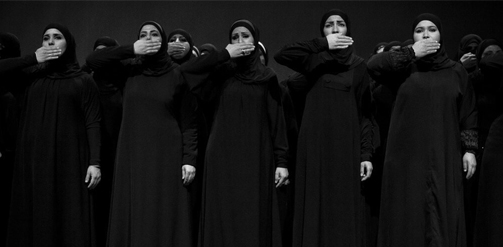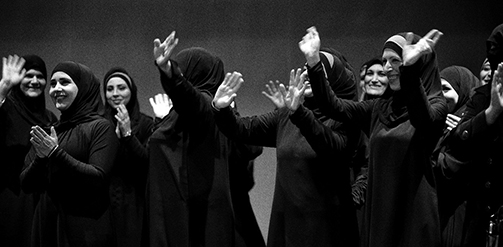“Look at Me. You will see a tragedy walking on two legs.” The young actress, her profile draped in black linen against the stark white screen, utters these words under the guise of an ancient Greek woman of Troy. But something in her eyes, her stance, her tone, reveals how deeply these lines reflect her own reality. She is one of fifty women documented in Queens of Syria, a film that follows a group of displaced Syrian women in Jordan as they write, act, and produce an innovative performance of Euripides’ ancient Greek tragedy.

Why theatre is critical to development storytelling
In the development sector, projects such as this are rarely prioritised or funded. Storytelling, especially through theatre, is overlooked and underfunded as a mode of social transformation and liberation for refugees. But as academics including Sara Ahmed have argued, presenting ‘others’ stories through acting goes a step further than narrative by engaging all of the senses, embodying displaced people’s oppression in a way that comes closer to their truth.
Ahmed gives us a reason to keep trying to embrace the other:
“What allows us to face each other…is also what allows us to move beyond the face, to hear and be touched by what one cannot grasp, as that which cannot be assimilated in a moment of recognition or other ‘the Other’ or the stranger”
Storytelling through theatre paves the way for an intimacy that leads us to realise how much we won’t be able to understand. But we must strive to listen, to hear, to face the ‘other.’
As Ahmed struggles, like I so often have, to find a responsible and ethical way to encounter the other, she warns that “an ethics that keeps alive the circuit between mouths, ears, and skin is hence not about making the body present,” but about understanding and grappling with the silent traumas and that hide under every encounter. Theatre pushes audience members to address the unsaid traumas by adding movements, facial expressions, and actions to the didactic telling of severe mental and physical pain.
Storytelling as liberation in the Syrian context
Queens of Syria began as a documentary but is now on tour as a live show. Scenes of Trojan women struggling as their families and city are torn apart before their eyes are interspersed with present day personal letters from the actors to those still in the war zone in Syria. It is in these moments that I – as a member of the audience-began to visualise what it would be like to be the recipient of these letters and witnessed first-hand how storytelling can humanise and personalise the Syrian crisis as what Juanita Johnson-Bailey aptly describes as an “intimate expression, a form of revelation, and a way of constructing a bridge of understanding between the narrator and the audience.”
Even more importantly (from a refugee and development perspective), this project allows the actresses to make sense of the world around them and reflect on their past traumas. Johnson-Bailey has argued that storytelling is even more important for smaller and disenfranchised groups because they are often excluded from the writing of their history. While re-writing the script and adding her own perspectives, the narrator “orders events and establishes significance,” and may come to more deeply understand what she has gone through without society defining it for her.
One thing that has been clear during the Syrian crisis is how much everyone else, especially the media, NGOs, and governments, have taken it upon themselves to tell displaced people’s stories. So rarely have refugees, especially women, been able to tell their own stories on their own terms. As many of the women expressed in the documentary, Syrian women usually don’t openly recount their stories because they have family still in Syria and plan to return to their homeland. Openly talking about the war as it rages on could be a death sentence for them or their families.
Drama as Therapy
The privilege of being able to tell your narrative openly without fear of consequence is something I rarely used to think about. Programmes like this theatre group created by the organisation Developing Artists supports women to transcend their circumstances, allowing them to place their own trauma in a wider history spanning thousands of years. Drama therapy shifts participants into a different time, a different place, creating a space where these women can open up in a way they are rarely afforded. When one inhabits another character who has gone through similar tragedies, the physical movements, mannerisms, and lines can lead to an unanticipated opening up, a process of grieving and reflection.
As Pesant and Zadra explain in their paper, psycho-therapists use dream recognition as an effective and less abrasive avenue through which to understand patient’s trauma. In the same way, drama therapy can elicit “indirect expression through metaphor and symbol…[which] provide access that is allowed by the client whereby direct representation would be overwhelming” Even so, it is not some magical solution that erases their worries and post-traumatic stress. But it is something that needs to be implemented in more refugee communities and camps.
What’s Next?
But what happens after the play? The film? The confidence that the women gained during the creation of Queens of Syria is evident. In a CNN interview, the women expressed how much they wanted to travel to London to show this film and tell others about their current realities. In 2016, the play debuted in theatres all over London and as I write this the screening tour of the film is under way. By working together to produce such a powerful piece these women find themselves as public figures speaking out for fellow refugees and against the horrible racism they face. So please, go to the Queens of Syria website and find a screening near you.
As I watched these brave, resilient, heartbroken women on screen, I couldn’t stop thinking about one line in Ahmed’s article that we had discussed in class: “It is only in facing up to you, that I miss your face. Something gives.”
